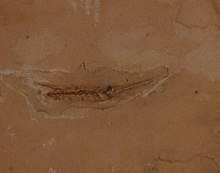Aeoliscoides is an extinct genus of prehistoric ray-finned fish that lived from the early Eocene. It is known from a single species, A. longirostris, from the famous Monte Bolca site of Italy.[1][2] It was a member of Centriscidae, making it a relative of modern shrimpfish and snipefish.[3][4] Its name references its close resemblance to the extant shrimpfish genus Aeoliscus.
| Aeoliscoides Temporal range:
| |
|---|---|

| |
| Specimen at the Musée d'Histoire Naturelle, Verona | |
| Scientific classification | |
| Domain: | Eukaryota |
| Kingdom: | Animalia |
| Phylum: | Chordata |
| Class: | Actinopterygii |
| Order: | Syngnathiformes |
| Family: | Centriscidae |
| Genus: | †Aeoliscoides Blot, 1980 |
| Species: | †A. longirostris
|
| Binomial name | |
| †Aeoliscoides longirostris (Blainville, 1818)
| |
References
edit- ^ Sepkoski, Jack (2002). "A compendium of fossil marine animal genera". Bulletins of American Paleontology. 364: 560. Archived from the original on 2011-07-23. Retrieved 2009-02-27.
- ^ "PBDB". paleobiodb.org. Retrieved 2024-03-07.
- ^ Carnevale, G.; Bannikov, Alexandre F.; Marramà, G.; Tyler, James C.; Zorzin., R. (2014). "The Bolca Fossil-Lagerstätte: A window into the Eocene World. 5. The Pesciara- Monte Postale Fossil-Lagerstätte: 2. Fishes and other vertebrates. Excursion guide" (PDF). Rendiconti della Società Paleontologica Italiana. 4 (1): i–xxvii. hdl:10088/25678.
- ^ Parin, Nickolay; Micklich, Norbert (1996). "Fossil gasterosteiformes from the lower oligocene of Frauenweiler (Baden-Württemberg, Germany) I. New information on the morphology and systematics of the genusAeoliscusJordan &Starks 1902". Paläontologische Zeitschrift. 70 (3): 521–545. doi:10.1007/BF02988090.